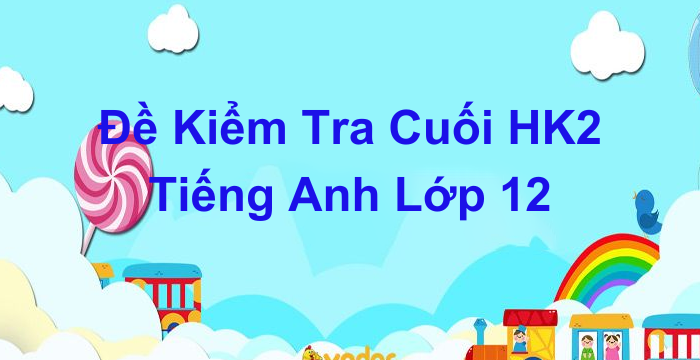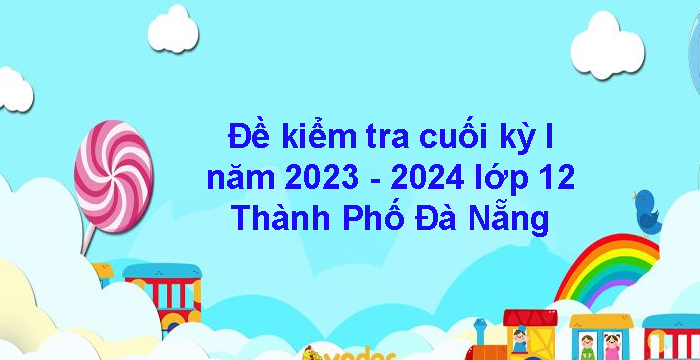Đề Kiểm Tra Cuối Kì 1 Tiếng Anh Lớp 12 Global Success (31.12.2024)
Thầy Thắng
KIỂM TRA CUỐI KÌ LỚP 12
15
Ngày đăng: 31-12-2024 11:00:30

ĐỀ KIỂM TRA CUỐI HỌC KỲ I
Trung Tâm Giáo Dục Thường Xuyên Số 2, TP Đà Nẵng, 2024 - 2025
Thời gian: 60 phút
Mã đề: 103
I. Listening
1. You will listen to two students discussing a project on international culture with a mentor. Listen carefully and choose whether TRUE or FALSE for the following questions.
Question 1: The students decided to research the origins of festivals in different countries.
Question 2: They are specifically studying how people's attitudes towards the difference.
Question 3: The students have not started any research on the carnival yet.
Question 4: Historically in Europe, people wore special accessories and costumes on the first day of the year to celebrate the beginning of the season.
2. You will listen to a recording talking about urbanization and the rise of megacities. Listen carefully and mark the correct answer (A, B, C, or D) for the following questions.
Question 5: In 1950, which cities are so-called megacities?
A. San Diego and Vancouver
B. New York and Tokyo
C. Osaka and Mexico
D. Sao Paulo and Chicago
Question 6: By 2010, approximately how many megacities existed worldwide?
A. 10 B. 15 C. Over 20 D. Over 30
Question 7: What is TRUE about the growth of megacities today?
A. The number of megacities today is less than 20.
B. Urbanisation is occurring faster than at any time in history.
C. Africa currently has over half of the world's megacities.
D. By 2030, there will be fewer megacities than today..
Question 8: Where is the most rapid urbanisation expected in the future?
A. Asia B. Africa C. South America D. Europe
II. Language
Read carefully and mark the correct answer (A, B, C or D) for each question
Question 9: Moving abroad was exciting, but I experienced severe ______ shock when I couldn't adjust to the new culture.
A. international B. cultural C. natural D. traditional
Question 10: Factories are responsible for releasing harmful ______ into the atmosphere, which affects air quality.
A. bottles B. litters C. packages D. pollutants
Question 11: Many large cities are struggling with a housing _________, making it hard for people to find affordable housing.
A. miss B. shock C. short D. shortage
Question 12: The latest superhero movie became a _______, earning over $1 billion at the box office.
A. achievement B. video C. document D. blockbuster
Question 13: _______ the employees nor the managers were satisfied with the new working hours.
A. both B. neither C. none D. either
Question 14: Arrange the following lines correctly to form a logical conversation:
1. Absolutely. It may take time, but small steps now will make a big difference in the long run.
2. Yes, but it's hard to predict how quickly these changes will happen. Some people still don't recycle or reduce waste.
3. That's a good point. In the short term it's hard to make any change, but people need to be more aware of its benefits.
4. I guess you're right. I think governments are going to introduce stricter regulations to encourage sustainable living.
5. I think living green is becoming more important these days. What do you think?
A. 5-4-2-3-1 B. 5-4-1-3-4 C. 5-4-2-1-3 D. 5-4-3-2-1
Question 15: Government programs are being introduced to address the _____ by building more affordable homes.
A. infrastructure degradation B. pollution
C. housing shortage D. unemployment
Question 16: When he came, I ______ in the kitchen.
A. am cooking B. was cooking C. cooked D. has cooked
Question 17: While she _______ for the meeting, her colleagues ________ the agenda in the conference room.
A. prepared - were discussing B. was preparing - discussed
C. prepared - discussed D. was preparing - were discussing
Question 18: She ______ all her assignments ahead of the deadline so she can have a rest today.
A. hasn't completed B. has completed C. didn't complete D. completed
Question 19: __________ you practice speaking English, ______ confident you will become.
A. the less - the more B. the less - the less
C. the more- the more D. the more the less
Question 20: A(n) _______ in the career path is usually based on how you perform at work.
A. appreciation B. bonus C. promotion D. flexible schedule
Question 21: Many Asian students in ______ US are facing discrimination.
A. a B. Ø C. the D. an
Question 22: Arrange the following lines correctly to form a logical conversation:
1. I'm afraid there's a problem with the air conditioning - it wasn't working at all, and the room was too hot.
2.I completely understand, and I apologise for the inconvenience. We promise never to make the same mistake again. To make up for it, I'll arrange for a discount on your bill.
3. Excuse me, I want to complain about the room I stayed in last night.
4. I appreciate that. Thank you
5. I'm sorry to hear that. Could you tell me what the issue was?
A. 3-1-5-4-2 B. 1-3-5-2-4 C. 3-5-1-2-4 D.5-3-1-2-4
II. Reading
1. Complete the following passage by choosing the correct answer for each blank.
In the age of globalisation, 23. ______ to the Internet and the media provide instant contact with many cultures. A person's cultural 24. _______ may be influenced by certain aspects of other cultures. When people move to a new culture, they may react 25. _______. Some people feel a strong urge to keep their cultural uniqueness, 26. _____ they continue speaking their language, cooking their food, wearing their traditional clothing, and celebrating their festivals. They also insist that their children and grandchildren 27. ______ their cultural identity.
Question 23: A. place B. door C. bridge D. access
Question 24: A. tradition B. lifestyle C. background D. identity
Question 25: A. positively B. differently C. negatively D. similarly
Question 26: A. but B. if C. and D. so
Question 27: A. store B. keep C. save D. maintain
2. Read the following passage carefully and choose the correct answer for each question.
Human populations have tended to increase over time. As more people were born, small groups of individuals found reasons to come together to form groups and, with the advent of agriculture, small sedentary communities. A small number of these settlements grew into what we now call cities. This kind of growth often corresponds with a shift from one way of organising labour to another.
The world population has grown significantly, and our economies have become more industrialised over the past few hundred years. As a result, many more people have moved into cities. This process is known as urbanisation. Even after cities emerged, however, a large majority of people lived and worked in rural areas. It was not until large-scale industrialisation began in the 18th century that cities really began to boom. Nearly half of all people now live in urban areas. They are attracted by jobs in manufacturing and the professions, as well as by increased opportunities for education and entertainment. Urbanisation is often discussed in reference to countries that are currently in the process of industrialising and urbanising, but all industrialised nations have experienced urbanisation at some point in their history. Moreover, urbanisation is on the rise all over the globe.
One effect of this huge increase in people living in urban areas is the rise of the megacity, which is a city that has more than 10 million inhabitants. There are now cities with even more than that. Tokyo, Japan, for example, has nearly 40 million residents. Another effect of urbanisation is urban sprawl. Urban sprawl is when the population of a city becomes dispersed over an increasingly large geographical area. This movement from higher-density urban cores to lower-density suburbs means that as cities expand, they often begin to take up significant tracts of land formerly used for agriculture. Sprawl also increases the need for travel infrastructure, such as roads, because people's homes are likely to be farther away from where they work and the amenities they enjoy.
As we move forward in the 21st century, the global population is likely to continue growing. Urban areas will continue to grow with the population. This continual growth presents complex challenges as we prepare for the cities of the future. How we choose to manage urbanisation will have consequences for our world for many years to come.
Question 28: What term is used to describe some small settlements that grew larger?
A. Villages B. Cities C. Town D. Tribes
Question 29: What attracts people to urban areas, according to the passage?
A. Jobs, education, and entertainment opportunities
B. Better weather conditions
C. Natural resources
D. Increased access to land for farming
Question 30: What is a megacity?
A. A city with more than 5 million inhabitants
B. A city with more than 40 million inhabitants
C. A city with more than 10 million inhabitants
D. A city with more than I million inhabitants
Question 31: Which city is mentioned as having nearly 40 million residents?
A. Tokyo, Japan
B. Mumbai, India
C. London, UK
D. New York, USA
Question 32: What is a possible solution to address the challenges of urbanisation mentioned in the passage?
A. Encouraging people to move away from urban areas to rural locations
B. Managing urbanisation through strategic planning for sustainable cities
C. Expanding agricultural land within the city
D. Limiting population growth by restricting urban development
IV. Writing
Rewrite the sentences as directed without changing the meaning.
Question 1: Public transportation / improve / quality / life / communities.
______________________________
Question 2: The percentage/green spaces / Vietnam / increase / significantly / 2019.
______________________________
Question 3: She prepared the presentation, and her team discussed the agenda. (While)
______________________________
Question 4: Spending time on hobbies increases your happiness. (The more)
______________________________
—THE END—
Giải đáp mọi thắc mắc trong đề vui lòng liên hệ Zalo: 034 8371 758
Theo dõi fanpage để cập nhật nhanh các bài tập và đề kiểm tra mới nhất.
https://www.facebook.com/profile.php?id=61555984765050
Bài Viết Liên Quan

Đề Kiểm Tra Cuối Kì 1 Tiếng Anh Lớp 12 Global Success (30.12.2025)

Đề Kiểm Tra Cuối Kì 1 Tiếng Anh Lớp 12 Global Success (25.12.2025)

Đề Kiểm Tra Cuối Kì 1 Tiếng Anh Lớp 12 Global Success (10.12.2025)

Đề Kiểm Tra Cuối Kì 2 Tiếng Anh Lớp 12 Global Success (21.05.2025).

Đề Kiểm Tra Cuối Kì 1 Tiếng Anh Lớp 12 Global Success (06.01.2025)

Đề Kiểm Tra Cuối Kì 1 Tiếng Anh Lớp 12 Global Success (27.12.2024)

Đề Kiểm Tra Cuối Kì 1 Tiếng Anh Lớp 12 Global Success (27.12.2024)

Đề Kiểm Tra Cuối Kì 1 Tiếng Anh Lớp 12 Global Success (26.12.2024)

Đề Kiểm Tra Cuối Kì 1 Tiếng Anh Lớp 12 Global Success (25.12.2024)

Đề Kiểm Tra Cuối Kì 1 Tiếng Anh Lớp 12 Global Success (23.12.2024)

Đề Kiểm Tra Cuối HK2 Tiếng Anh Lớp 12 (26.04.2024)

Đề Kiểm Tra Cuối HK2 Tiếng Anh Lớp 12 (14.04.2024)

Đề Kiểm Tra Cuối HK2 Tiếng Anh Lớp 12 (11.04.2024)

Đề Kiểm Tra Cuối HK2 Tiếng Anh Lớp 12(30.03.2024)

Đề Kiểm Tra Cuối HK2 Tiếng Anh Lớp 12(30.03.2024)

Đề Kiểm Tra Cuối HK2 Tiếng Anh Lớp 12(29.03.2024)

Đề Thi Cuối Kì 1 Tiếng Anh lớp 12

Bài Đăng Gần Đây

Đề Cương Ôn Tập Giữa Học Kì 2 Tiếng Anh Lớp 7 Global Success (24.02.2026)

Đề Kiểm Tra Giữa Kì 2 Tiếng Anh Lớp 7 Global Success (3.2.2026)

Đề Kiểm Tra Cuối Kì 1 Tiếng Anh Lớp 10 Global Success (02.01.2026)

Đề Cương Ôn Tập Cuối Học Kì 1 Tiếng Anh Lớp 8 Global Success (30.12.2025)

